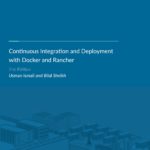Container Security Tools You Need to Know
Cyber security is no longer a luxury. If you need a reminder of that,
just take a look at the seemingly endless number of stories appearing in
the news lately about things like malware and security breaches. If you
manage a Docker environment, and you want to help make sure your
organization or users are not mentioned in the news stories that
accompany the next big breach, you should know the tools available to
you for helping to secure the Docker stack, and put them to work. This
post identifies the Docker security tools available (both native ones
from Docker itself and third-party options) that can help to secure your
Docker containers.
Docker Benchmark Security
 Our newly-updated eBook walks
Our newly-updated eBook walks
you through incorporating containers into your CI/CD pipeline. Download
the ebook
One of the first security tools for Docker that you should check out is
Docker Benchmark for
Security. Docker
Benchmark for Security is a simple script that is designed to test your
Docker deployment to ensure that it adheres to established security best
practices. One of the things that makes Docker Benchmark for Security so
useful is that the development of the best practices was based on a
consensus of opinions from industry experts in a variety of different
job roles. Consultants, software developers, and security and compliance
experts all had a voice in establishing the best practices. You can find
a full description of the best practices and the rationale behind them
on the Center for Internet
Security.
CoreOS Clair
CoreOS Clair is a vulnerability
scanning engine that is designed for Docker containers. This API-based
scanning engine looks at each container layer, and searches for and then
reports on known vulnerabilities. CoreOS Clair has two primary use
cases. First, Clair is useful for checking images that you did not
create yourself. If, for example, you were to download an image from the
Internet, it would be difficult to know for sure whether or not that
image is safe for use. CoreOS Clair can help you make that
determination. A second use case for CoreOS Clair is that it can be used
to block and/or alert you to the use of insecure software.
Docker Security Scanning
Docker Security Scanning is another
security vulnerability scanning tool for Docker. While it might be
tempting to dismiss this tool as just another scanning engine, there are
a couple of things about this tool that make it worth paying attention
to. First, Docker Security isn’t limited to only scanning Docker
containers. The tool also checks for Docker installation security
issues. Furthermore, the tool is able to scan both local and remote
Docker installations. The other thing that makes Docker Security
Scanning worth a look is the fact that it is based around the use of
plugins. These plugins make Docker Security Scanning extensible, so that
functionality can be added as the tool matures. They are designed to be
easy to write, so an organization could conceivably create plugins for
its own purposes.
Drydock
Drydock is designed to function similarly to Docker Benchmark for
Security, but is intended to be more flexible in its use. Like Docker
Benchmark, Drydock is a security auditing tool for Docker. The thing
that makes Drydock so unique is that it allows its users to create
custom audit profiles. These profiles can be used to fine-tune the
auditing process by eliminating audits that are known to cause a lot of
clutter within the resulting report (noise alerts). Drydock’s custom
audit profiles can also be used to deactivate audit tests that do not
pertain to your environment, or are known to produce false alarms.
Unlike some of the other tools that are available, Drydock makes it
surprisingly easy to create custom profiles. The tool includes a
built-in profile that contains all of the audit tests that will be
performed. You can prevent a check from running simply by commenting out
the check. You can download Drydock on
GitHub.
Twistlock
Twistlock is yet another security auditing
tool for Docker. One thing that makes Twistlock different from some
competing solutions is that it is a commercial application. There is a
free Developer Edition, and a licensed Enterprise Edition. Twistlock is
designed to scan each individual layer of the container stack, and is
able to use content fingerprinting techniques to identify the various
components, as well as known vulnerabilities that may be associated with
those components. The Enterprise Edition of Twistlock uses machine
learning to help to identify vulnerabilities. It also provides automated
policy creation and enforcement capabilities. The free Developer Edition
has a lot of similarities to the Enterprise Edition, but requires
policies to be created manually, and relies upon community support. The
Developer Edition is also limited to 10 repos and two hosts.
Conclusion
As Docker has matured and moved into production, the importance of
properly securing Dockerized environments has increased. Fortunately, a
range of tools, including both free and commercial options, are
available for helping to harden your Docker stack with more (like
Deepfence, NeuVector,
and Anchore) appearing all time. Brien
Posey is a freelance technology author and 15-time Microsoft MVP. Prior
to going freelance, Posey was a CIO for a national chain of hospitals
and healthcare facilities. He also served as Lead Network Engineer for
the United States Department of Defense at Fort Knox. In addition to
Posey’s continued work in IT, Posey is in his third year of training as
a commercial scientist-astronaut candidate.
Related Articles
Jul 03rd, 2023
Meet Elemental: Cloud Native OS Management in Kubernetes
Dec 14th, 2023